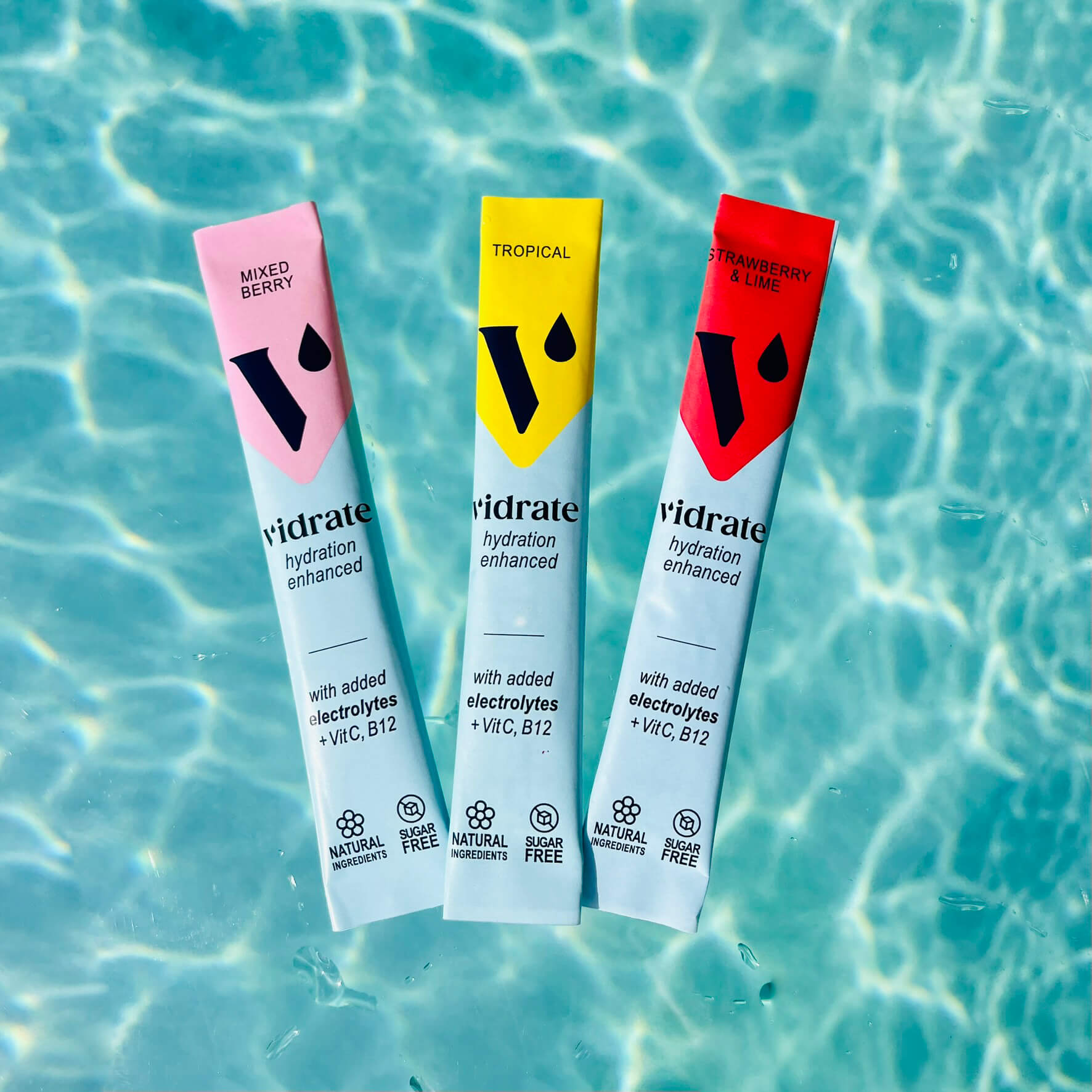We're all familiar with the term electrolytes as it pertains to exercise. It's been drilled in our heads by health coaches and sports drink companies that we must always remember to replenish our electrolytes after a sweaty workout. But exactly what are electrolytes and why is it so important that we have them? Electrolytes are defined as particles that conduct electricity when dissolved in water. Electrolytes are found in the body in our blood, urine, and sweat. They are essential minerals that when dissolved, form positive or negative ions that help our bodies perform metabolic functions. The electrolytes in our bodies include potassium, bicarbonate, sodium, chloride, calcium, magnesium, and phosphate. Read on to learn why electrolytes are important and how you maintain a proper balance.
Why Electrolytes Are Important
As mentioned, your body needs electrolytes to perform important functions. Those functions include nerve and muscle function, as well as maintaining acidity levels and hydration. Having too little or too high levels of electrolytes can disrupt these functions and lead to potentially serious health consequences. For example, potassium is needed by the nervous system to regulate the heartbeat. An abnormal increase or decrease in potassium could lead to heartbeat malfunction or arrhythmias. Serious arrhythmias can sometimes be fatal if left untreated. Electrolytes are also responsible for keeping the body well hydrated. Proper hydration is necessary for regulating our body temperature and delivering nutrients to our cells, among many other important bodily functions. When you are low on electrolytes, your body won't be functioning as well as it should. While minor electrolytes imbalance may not produce any symptoms, severe electrolytes imbalance symptoms may include:
- Fatigue
- Irregular heartbeat
- Fast heart rate
- Nausea/ Vomiting
- Muscle weakness and cramping
- Headache
- Convulsions
- Confusion
- Muscle twitching/ Spasms
Preventing these conditions are why electrolytes are important. Because while an electrolyte imbalance is generally not severe enough to cause serious harm, it can be without proper intervention. It's important to remain hydrated and replenish electrolytes, especially if you are experiencing any of the above symptoms. An electrolyte imbalance can be monitored by regular blood tests. If you suspect you may have an electrolytes imbalance, make an appointment with your doctor to get checked out. In extreme cases of dehydration, doctors can administer an IV to replenish your body with fluids and electrolytes. However, this is preventable with a proper diet and drinking enough water.
What Causes Electrolytes Imbalance?
We lose electrolytes through any major loss of fluids from our bodies. Persistent vomiting, diarrhoea, or profuse sweating can cause electrolytes imbalance. Therefore, it is always suggested to drink lots of water when we are sick as many illnesses can lead to fluid loss. In addition to being sick, strenuous exercise or excessive heat can lead to losing large amounts of electrolytes through sweat. Improper diet, chronic respiratory illnesses, higher than normal PH levels in the blood, and certain medications (like steroids, diuretics, and laxatives) can also lead to electrolyte imbalances. In order to maintain healthy levels of electrolytes, we must continually replenish them. We can do this by eating a balanced diet of foods that contain electrolytes such as spinach, beans, avocados, oranges, strawberries, or soybeans.
It's also important to note that refraining from excessive alcohol consumption can help us prevent electrolytes imbalance. Alcohol acts as a diuretic and therefore causes us to lose a lot of water through urine. If you're familiar with the term 'breaking the seal' you'll know that it refers to alcohol's effect on our bladder. This is due to alcohol inhibiting a hormone in our body that helps us hold on to water instead of losing it through urination. Alcohol can further cause electrolytes imbalance if one consumes enough to lead to vomiting or diarrhoea. There's a reason college students keep a case of Pedialyte in their fridge to help them nurse their weekend hangovers.

Why Electrolytes Are Important After Exercise
When you exercise, your body produces sweat to help regulate your body temperature. You lose both water and electrolytes through sweating. How many electrolytes you lose depends on many factors. How much you sweat for one, and how much you sweat can depend on the temperature, the intensity of your workout, and the duration of your workout. In addition, how many electrolytes you lose during exercise can depend on personal factors such as age, gender, how hydrated you were beforehand, body composition, and diet. It's normal to lose some electrolytes through exercise and typically is nothing to be concerned about. In general, moderate exercise for 60 minutes or less done in cool temperatures should not produce excessive electrolytes imbalance. However, it's still important to hydrate with water.
More intense or workouts longer than 60 minutes is likely to create more electrolytes imbalance, especially if done in warmer temperatures. Those who train consistently for one hour or more should be concerned about replenishing electrolytes. It's also important to note that individuals who sweat more profusely than others may need to replenish their electrolyte levels more often. Nowadays, there are plenty of beverages on the market that are formulated for correcting electrolytes imbalance. Sports drinks such as Gatorade and Propel are tasty pre-made electrolyte beverages designed for athletes and workout fiends. Additionally, there are plenty of individually packaged powdered electrolyte formulas that are designed to be quickly and easily added to water. ViDrate is among the many powdered electrolyte drinks that can be tossed in a gym bag or stored in your pocket until you are ready to mix them in water.

Coconut water, while being a delicious, tropical refreshment, is also a good source of electrolytes. Coconut water naturally contains electrolytes potassium, sodium, and manganese. While many of the electrolyte drinks on the market provide adequate hydration, they can also come with added sugars and other miscellaneous ingredients. If you prefer to go the more natural approach to replenish your electrolytes, coconut water is a good choice. Another option would be to add a pinch of salt to your water while you're working out. Salt will replace any sodium you may have lost through sweating, and it's a natural ingredient most of us have in our kitchen cupboards.
Sweat Safely
Athletes may have to worry more about electrolytes imbalance because of their regular sweat sessions during the training. However, if they are eating a balanced diet and staying hydrated, they shouldn't encounter any serious health problems. That being said, it's important to listen to your body. If you feel like something is off, or you are experiencing any of the previously mentioned symptoms of electrolytes imbalance, you may need to up your water and electrolyte intake. You can do that by eating more foods into your diet that naturally contain electrolytes or by drinking electrolyte beverages as mentioned above. You could also add taking supplements to your daily routine. Supplements, however, should be consumed in the proper amounts necessary for your body. It can be just as harmful to have an over imbalance of electrolytes as it is to have an under imbalance. Athletes and workout fiends should also be cautious of how hard they are pushing during their training sessions. While pushing yourself at the gym is sometimes a good thing, overexertion can lead to problems besides electrolytes imbalance, like injury and fatigue. Taking care of your body will prevent you from encountering problems that could stall your progress. Knowing your body signs of distress will allow you to workout smarter and sweat safely.












